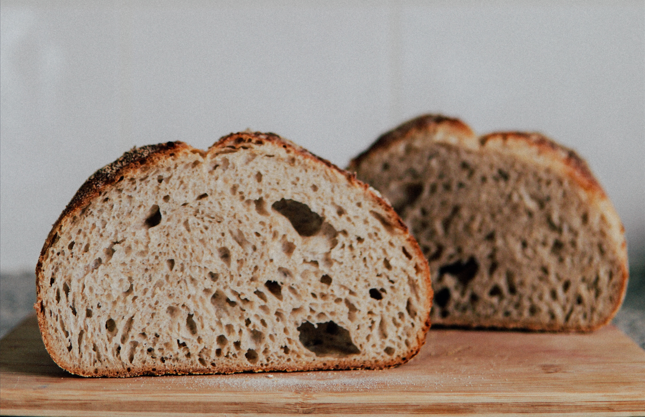I love when the Scriptures capture for us common, human moments between Jesus and the disciples. The disciples, again, forgot to bring enough food. Come on guys! So when Jesus makes a comment about leaven, or yeast, which is integral to bread, they immediately jump onto the assumption that Jesus is upset that they are such poor party planners.
You can feel the frustration rolling off of Jesus. “Don’t you understand anything?! Where have you been all this time? The bread thing is fine guys, I got it. Didn’t you hear what I said about the yeast, which was a convenient metaphor since all you seem to think about is not having enough bread after we’ve left somewhere that has some?!”
All jokes aside, what was Jesus actually trying to point out about the yeast and the Pharisees? In order to understand the metaphor, we need to understand yeast’s function in bread. Yeast, or as Jesus says, leaven, begins alive. It is a broad term for a whole host of good bacteria, also known as microflora. The yeast is introduced to flour, water, and salt and left to rise. As the yeast consumes the sugars in the flour, the microflora grow and multiply, expanding their space and causing the whole dough to rise. If the yeast is stale, old or otherwise compromised, the loaf will be undersized, sour and perhaps not rise at all. If the yeast was already dead because it had not been fed (again, yeast is a living thing before baking), no rising will occur and you will be left with flat bread.
Jesus wanted to warn His disciples about the leaven of the Pharisees and of Herod. Since they had spent so much time focused on bread, perhaps it made sense to go a step further and consider how bread was made. In order to be a hearty loaf, well cared for, quality yeast is needed. The teachings of Jesus would fall into this category. The teachings of the Pharisees were stale, uncared for and compromised. The ways of Herod led to spiritual death. While it might be tempting to incorporate the teachings of those who were popular at the time, they would not produce a good “loaf of bread.”
If we want to follow Jesus’ baking advice, we have to use fresh yeast in our bread. We need to fill ourselves with what is good and true so that what we produce with our actions is life-giving to everyone we share it with.
Me encanta cuando las Escrituras capturan para nosotros momentos humanos comunes entre Jesús y los discípulos. Los discípulos, nuevamente, se olvidaron de traer suficiente comida. ¡Ay chicos! ¿de verdad? Entonces, cuando Jesús hace un comentario sobre la levadura, que es parte integral del pan, inmediatamente toman por hecho que Jesús está molesto porque son tan malos planificadores de fiestas.
Puedes sentir la frustración de Jesús. “¡¿No entiendes nada?! ¿Dónde has estado todo este tiempo? Lo del pan está bien chicos, yo me los arreglo. ¿No escuchaste lo que dije sobre la levadura, que era una metáfora conveniente ya que parece que todo lo que piensan es en no tener suficiente pan después de que hayamos ido a algún lugar que lo tenga?
Bromas aparte, ¿qué estaba tratando de señalar Jesús acerca de la levadura y los fariseos? Para entender la metáfora, tenemos que entender la función de la levadura en el pan. La levadura comienza viva. Es un término amplio para una gran cantidad de bacterias buenas, también conocidas como microflora. La levadura se introduce en la harina, el agua y la sal y se deja crecer. A medida que la levadura consume los azúcares de la harina, la microflora crece y se multiplica, expandiendo su espacio y haciendo que suba toda la masa. Si la levadura está rancia, vieja o en mal estado, la rebanada será demasiado pequeña, se agriará y tal vez no suba nada. Si la levadura ya estaba muerta porque no había sido alimentada (nuevamente, la levadura es algo vivo antes de hornearse), no se levantará y te quedarás con pan plano.
Jesús quería advertir a sus discípulos acerca de la levadura de los fariseos y de Herodes. Dado que habían pasado tanto tiempo concentrados en el pan, tal vez tenía sentido dar un paso más y considerar cómo se hacía el pan. Para que sea una rebanada abundante, bien cuidada, se necesita levadura de calidad. Las enseñanzas de Jesús entrarían en esta categoría. Las enseñanzas de los fariseos estaban obsoletas, descuidadas y comprometidas. Los caminos de Herodes llevaron a la muerte espiritual. Si bien podría ser tentador incorporar las enseñanzas de aquellos que eran populares en ese momento, no producirían una buena “rebanada de pan”.
Si queremos seguir el consejo de Jesús para hornear, tenemos que usar levadura fresca en nuestro pan. Tenemos que llenarnos de lo que es bueno y verdadero para que lo que producimos con nuestras acciones sea vivificante para todos aquellos con quienes lo compartimos.
 Kate Taliaferro is an Air Force wife and mother. She is blessed to be able to homeschool, bake bread and fold endless piles of laundry. When not planning a school day, writing a blog post or cooking pasta, Kate can be found curled up with a book or working with some kind of fiber craft. Kate blogs at DailyGraces.net.
Kate Taliaferro is an Air Force wife and mother. She is blessed to be able to homeschool, bake bread and fold endless piles of laundry. When not planning a school day, writing a blog post or cooking pasta, Kate can be found curled up with a book or working with some kind of fiber craft. Kate blogs at DailyGraces.net.
Feature Image Credit: Elle Hughes, www.pexels.com/photo/slices-of-tasty-fresh-bread-on-cutting-board-5764067/

